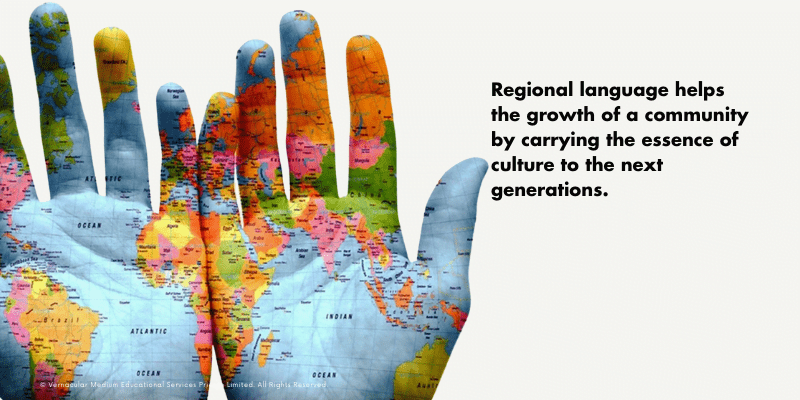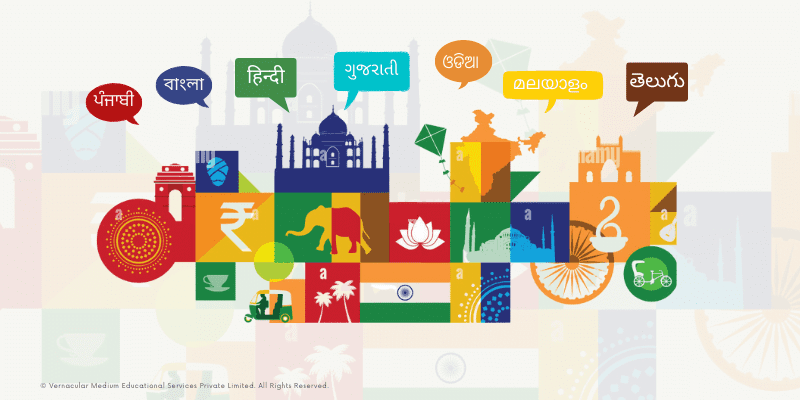Nowadays English Medium schools are taking over vernacular medium schools. Many people think learning in vernacular languages is not worth it. But that’s not true. Learning in vernacular languages has many benefits.
In the past, learning in vernacular languages has been frowned upon. It was considered a shame, and people would be accused of intelligence or linguistic incapability. However, it is not shameful to learn in one’s native language. It is a beauty that the person can quote someone such as Rabindranath Tagore and know what he meant when he said, “I am lost when I forget my childhood”.
It is not shameful to learn in one’s language; rather, it is prideful because the individual will have more understanding than someone who refuses to communicate in their native tongue. Understanding vernacular languages will also help the students understand the emotions and historic background of the community in which they live.
This will help them to understand other communities more than before. This can be observed either with the learning of Basque by individuals such as Joseba Sarrionandia or with the overwhelming learning that occurs when English is used in a Spanish-speaking environment.
This attitude towards vernacular languages is changing. Thanks to the growth of globalization and communication technologies; it has now been proven that learning an additional language can improve one’s education. It can also increase employability, and increase one’s sense of cultural identity.
What Does Vernacular Language Means?
Vernacular language is the mother tongue of the people. They are the original language that is spoken in our region. The people evolve their language and give it a new form. They change the accents and make the words according to their own culture. People use that language as their mother tongue when they move to other places.
Vernacular Language Is The Mother Tongue Of Each Nation:
This means that the people and their languages determine their culture, history, and way of life. Moreover, the people and their language are one with an entire nation’s identity, so they all share a common culture and history, even if they live across multiple countries.
Languages become more than just communications tools as they become part of a historical, cultural, religious, political, or social heritage that binds members of a society together in a way few other factors can achieve.
You might also be interested to know about National Education Policy 2020.

Vernacular Language Is A Valuable Asset For Learning And Communication:
The people’s knowledge and the resources available to them vary from place to place and from country to country. Vernacular languages are thus not uniform across national frontiers, and the languages spoken in different countries have similar but distinct characteristics. Each of these distinctions usually expresses the very specific knowledge, attitudes, beliefs, values, historical traditions, economic conditions, and so forth of its speakers.
The primary function of a vernacular language is that it provides its speakers with information that cannot be readily communicated in international communication systems. Vernacular languages provide us with an understanding of other people’s cultures by using their native or mother tongue.
Why Are Vernacular Languages Important For The World?
Vernacular languages are important for the world because they give a unique identity to the people of different countries. Everyone will have pride in their vernacular language. The world is one, and everyone should respect the other’s culture and identity. The help of vernacular languages can be a great help to the world.
How Are Vernacular Languages Helpful?
Vernacular languages are helpful because they provide us with an understanding of other people’s cultures using their native or mother tongue. They are important for all people because they help to understand the history and culture of others. In addition, vernacular languages give a unique identity to the people of different countries.
Everyone will have pride in their vernacular language. The world is one, and everyone should respect the other’s culture and identity. The help of vernacular languages can be a great help to the world.

How Do Vernacular Languages Influence Learning?
Vernacular languages are important for learning because they increase the students’ knowledge about different countries, people, and history. For example, they will know what kind of economic condition, political structure, and religion of any country. In addition, the vernacular language will help in studying human resource development as they can understand the cultures of different communities.
You may like to read about Digital Education! A Blatant Mockery To Many In India.
How To Use A Popular Language In International Communication Systems?
The use of popular language in international communication systems is a good idea. It will help people to communicate with each other. Everyone has the right to learn and know about the world. Furthermore, a common language will help develop friendships, which is important for progress.
Why Is Learning A Vernacular Language Not Shameful Rather A Pride?
Some people have difficulties in their second or third language, but this does not make learning in vernacular languages shameful; rather, it is prideful because the individual will have more understanding than someone who refuses to communicate in their native tongue. Understanding vernacular languages will also help the students understand the historic background of the community in which they live.
**********
Disclaimer:- Views expressed are the author’s own.




Admiring the article
True.